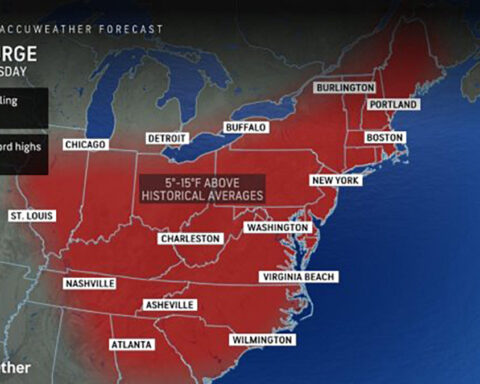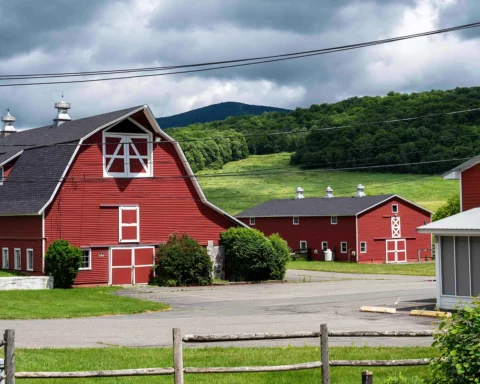The question of how long humans have been ice fishing might be best answered by another question: How long have humans run out of food in the middle of winter? One can imagine an ancestor gazing hungrily out over a frozen expanse of lake or pond, a gnawing ache in the belly matched by a gnawing panic about the survival of self, family, tribe. A prehistoric thought likely occurred one desperate day that provided a glimmer of hope: “If I’m awake and hungry during this deadly, dormant season, maybe, just maybe, those tasty fishes are awake, too, under that barrier of ice.”
Here in North America, artifacts of the practice of ice fishing suggest that indigenous peoples have been skilled in the winter harvest of fish for as long back as anyone can guess. Stone axes were likely used to chop holes in the ice, through which decoys made of bone, wood, or ceramic were lowered far enough into the water to attract a fish’s attention. Winter brought scarcity to the underwater world as well as to the early peoples. Insects don’t skim over the surface of the water or fall in accidentally as they do in the summer, providing a near steady source of protein. Vertebrate prey such as frogs and salamanders either hibernate completely, or reduce their activity to near complete stillness. A helpless food-shaped thing trembling near the surface would certainly temp the curiosity of a ravenous bass or trout.
The first ice fisher–folk likely used the technique of spearing fish as they came up to the surface. Speed and accuracy would be required, but a prolonged struggle at the end of handmade fishing line would be avoided. In places where the ice was thinner, clubbing the ice directly over a fish would send a shock wave that could often keep the fish paralyzed long enough to break up the ice and scoop the dazed meal up with bare hands.
Family Ice Fishing Festival
February 9, 2019, 8:30 a.m. to 12 p.m.
Scout Pond – Tolgy Wood, Chesterfield, Mass. (the old Chesterfield Scout Reservation at Sugar Hill Road in Chesterfield)
This is a free “learn to ice fish” event. Bring your ice fishing equipment, or borrow ours; equipment and bait will be available on a first-come, first-served basis.
This event is in cooperation with the Western Massachusetts Boy Scout Council.
*Open to the public, no pre-registration required. For more information contact Jim Lagacy at [email protected] or (508) 389-6309.
*PLEASE NOTE: Less than 6″ of safe ice, rain, or heavy snow will cancel this event.
The invention of hooks and fishing line, however, increased the fisherwoman’s or –man’s haul dramatically. Not needing to hope for a fish to swim all the way to the surface, a person with the means of fashioning a lure, or scaring up some live bait fish or worms, could set their hook at depth, creating a better opportunity to catch a big fish’s attention.
Opportunity and ingenuity seem to have married at similar times the world over, as the survival skill of ice fishing is found in nearly all cultures that make their homes where bodies of water freeze over annually. Today, ice fishing is generally thought of as a sport for much of the population that engages in it. Subsistence ice fishing is still a traditional food source for scattered communities around the world.
And this tradition, for sport or a reliable dinner, is one that continues to be handed down, both through family custom and through cultural preservation in Massachusetts.

Jim Lagacy, Angler Education Program Coordinator with the Massachusetts Division of Fisheries & Wildlife, spends his days sharing information about opportunities for fishing of all kinds in Massachusetts. Winter doesn’t represent a dormant time in his office, as he encourages families to explore this outdoor sport that is equally accessible to people of all ages. His office produces a number of ice fishing events throughout the Commonwealth to give residents a chance to experience one of the few pastimes you can enjoy standing still in freezing, or near-freezing, temperatures. The Family Ice Fishing Festival, coming up on February 9, in Chesterfield, Mass., is free annual event created to give the public zero barriers to entry into the sport.
“It’s an education program,” Lagacy explained during a telephone interview, “with the ultimate goal to get people interested in the outdoors through the experience of fishing. We want people to care about the outdoors, and the only way to care about it is to be invested in it.”
That investment in fishing the whole year round remains pretty affordable in 2019, with adult resident freshwater fishing licenses again available for $27.50 per year. Youth 15–17 do need a fishing license, though the fee is currently set to $0. What if you’re not sure if you want to invest even the $27.50 to try your hand at ice fishing? You’re in luck. Not only are most of the Mass FWS programs free, including the Family Ice Fishing Festival, but no fishing license is required to participate.
“So, if you’re 15 years old and above, you do need a fishing license to fish Massachusetts, unless it’s on Free Fishing weekend in June,” Lagacy said. “But for all of our Angler Education program events, you don’t. We have a program permit that covers everyone for the duration of the event. You can fish for free—adult, child, anyone.”
He said that the program is primarily geared toward beginners, with a priority placed on creating opportunities for families to try new experiences together in the great outdoors. Fishing, he said, remains a perennially popular family activity.
Lagacy said, “Fishing in general, if you compare it to hunting, is holding its own nationally. It’s a lot easier to get involved with. You don’t have to go learn how to shoot a bow or a rifle, a shotgun, anything like that. So it’s holding its own — in some demographics it’s increasing, in some it’s decreasing. But fishing is doing okay.”

For many urban dwellers, fishing represents a chance to get rare fresh air and tranquility. In all seasons, individuals, groups of friends, and families plan out time to make their escape to the Berkshires and other rural locales to use angling, fishing with a line and a hook, as a reason to get away from it all.
Chartering a guide for an ice fishing outing
Patrick Barone of South Hadley, Mass. took over Great Barrington-based Charter the Berkshires, a guided fishing expedition business almost four years ago. He says that he’s been fortunate to keep up a brisk business helping out-of-towners get a taste of the sportsman’s life. Ice fishing tours are one of the ways he can continue to make his passion a four-season enterprise.
“I actually purchased Charter the Berkshires coming up on four years ago now from a gentleman named Paul Tawczynski who owns Taft Farms in Great Barrington,” Barone explained by phone. “He had been running Charter the Berkshires for 13 years at that point and the farm store had really just started to take up too much of his time, and so he was looking for someone to continue his legacy of bringing fishing to families that live in the Berkshires as well as to the tourist families that we’re so lucky to have visiting the region. I was just in a fortunate position to know Paul and to have been doing a fly fishing guide services at that point. I was looking to expand, and you know everything seemed to work out, timing wise, so I’m lucky enough to be continuing the Charter the Berkshires tradition.
Slightly different experience in lower temperatures
Barone, who grew up on the South Shore of Boston, says he doesn’t mind chasing good fishing anywhere in the state for his clients. His knowledge of Cape Cod and the North Shore area benefit anyone looking to get into striped bass fly fishing. In the fall, he is able to offer Albacore charters as well. Summers in the Berkshires means lots of trout fishing on top of fishing the lakes by boat. Winter brings a new opportunities for customers with a little bit of an adventurous side. The fish, however, remain largely the same game all twelve months of the year.
Jim Lagacy says that, adjusting for different water temperatures at different depths in lakes and ponds, the experience of ice fishing isn’t too dissimilar from other seasons.

“They’re located a little differently in the pond or the lake,” he says, “but you if you’re a bass angler, a trout angler, a northern pike, a perch angler, you’re focused on those particular fish. Or if you’re a generalist like me, you just go out and set up your tip-ups or you take your jig stick and you catch whatever bites. It’s a way to break the doldrums in the winter and get out and have some fun on the ice.
Lagacy admits that ice fishing is not for everyone, saying that it is probably the smallest niche in all of the fishing pastimes. The understandable fear factor may cause people a certain amount of hesitation to try their hand at the sport. This year, in particular, an extended warm spell made conditions unsafe for an unusually long time.
Unpredictable temperatures delay ice formation, events
“Yeah, this year’s ice has been crazy,” Lagacy chuckled. “We had that cold snap before Thanksgiving that set up some of these ponds, especially out your way in the Berkshires. And people were ice fishing before Christmas, which is almost unheard of. And then it’s gotten warm. It’s gotten real mild, with lots of rain. So what generally happens is that the shoreline starts to erode first, especially on the northern end of the pond or the lake. And if you can’t get on the ice — and you could have good ice out in the middle, you could have six or eight or ten inches — but if you can’t get out on it, that’s a problem. It’s a problem for any of our events. If we see open water, we’re not going to have people come out. Especially for beginners, just the sight of open water on a water body, even if there’s big, large areas that are safe, it’s just disconcerting.
The Division of Fisheries and Wildlife puts an alert out on in December when the ice starts to form. Generally, Lagacy says, they don’t recommend anyone go out onto frozen bodies of water unless least they can verify three or four inches of solid blue or black ice. His programs don’t operate unless there’s at least six inches of solid ice, he says, because they want to give people the confidence to enjoy themselves, rather than spend the whole time anxious.
So, now that the mercury has been well into the frozen zone for a few weeks, ice fishing has begun in earnest. Other than thick ice, what’s required?
Basic ice fishing outfitting
“You need a drill,” says fishing guide Barone. “Or you can get a hand auger to get through the ice. It’s nice to have what we call like a flasher or a sounder. That’s to know how deep you’re fishing and will also help you locate fish through echolocation.”
“And then really only need,” he continued, “a little jigging rod and then a couple of tip-up setups to drill. You’re allowed five holes per person, so you can have five lines in the water per person. So if you were just fishing all alone, you could set up four passive traps with either worms or live bait like shiners or some other bait fish underneath those. Then you could be actively jigging in other holes that you’ve made while you wait for those traps to go off and catch some of the bigger fish.”
The waiting of course, is part of fishing regardless of the season
“And then, of course, you need a seat, so bucket to sit on, or something, while you’re fishing that hole,” Barone added.
Now, a logical question to ask at this point might be how Lagacy’s program can extend an invitation for beginners and families to try out a sport the requires at least some special equipment most people don’t necessarily have just lying around.
“We have plenty available,” Lagacy assures the public.
Despite the “while supplies last” sort of fine print, the programs are typically more than equipped for the turnout they’re used to.
“This is the caveat, just in case we get swamped. For most of our events, like our fresh water events, we’ll have like 150 rods, which is plenty. But we always have to put in that caveat, but 99 times out of 100, we have enough equipment for everyone.”

When clients charter a trip with Patrick Barone as a private guide, he makes sure that he has enough equipment and supplies for his paying customers, as well, of course. The technology he offers isn’t a guarantee of catching fish, but it does seem to bring the sport into the 21st Century, when the distraction of digital screens can create competition.
“People have an opportunity,” said Barone, “to really dial in on what they’re doing. “With those flashers and the fish finders, I’ve found that children, even teens, really focus in on it, because it turns it into a bit of a video game, where they get real active feedback from the fish in the water. They can watch their jig go down, and when they move, it moves. Then they can see the fish in the water rising to their jig. And basically you can watch the fish come up, and you go, ‘here, your gonna get a bite’ and then, boom! They get a bite, and they catch a fish. So when you show them how easy it can be, you get you get the kids in on the trip, and that really pulls the day together for a family out there. You just don’t want anybody to be cold.”
Some might argue that being cold is part of the experience for any outdoor Winter activity — this is the Berkshires, after all. On the other hand, unlike skiing or skating, ice fishing does involve a disproportionate amount of standing around. On a frozen body of water. Way out in the open
“What I always try to ensure,” Barone said, “is that I have availability for everyone that’s on a trip to bait a fish inside a shelter that’s heated should the conditions go a bit wonky on us. What that means is I that always have a shelter or two on every trip that I’ll put holes in, if necessary, to keep people out of the wind and to offer them somewhere to get out of the elements.”
No cost, no license event makes sport highly accessible
People looking to explore ice fishing for the first time would likely enjoy all the amenities Charter the Berkshires offers. Families looking for a budget-friendly introduction to learning about jigging, and tip-ups, and all the tips and terminology of the sport will appreciate the Family Ice Fishing Festival for it’s once a year, no-cost opportunity.
“You can just show up,” says Lagacy. “You don’t even you don’t even have to preregister for this particular event. Some we do ask that people preregister—more for our classroom programs. But right, just show up and it’s from soup to nuts—we’ll get you started. We’ll show you how to do it. You don’t need a license. You need to dress warm. I mean, you need to dress for the occasion, and most people know how to do that. But otherwise, yeah, show up, and see if it’s for you. That’s why we do it. So we don’t expect you to have you buy a lot of stuff, and buy license, if you don’t even know if you’re going to like it.”
The forecast for Saturday, February 9 in the Chesterfield, Mass. area is cloudy, with a daytime high temperature of 34ºF, which seems perfect for ice fishing. This is New England, though, and the Festival is still two weeks away, so keep your eyes on the skies, as they say.




![James Kennedy asks whether there's room for an economic hybrid in America: mashup of "Bald Eagle," photo by Saffron Blaze [CC BY-SA 3.0 (https://creativecommons.org/licenses/by-sa/3.0)], from Wikimedia Commons](https://www.greylockglass.com/wp-content/uploads/2019/01/bald_bison.jpg)





